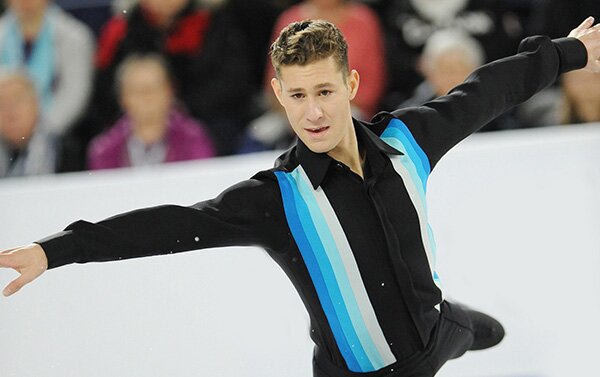

The first chapter of his new skating life took him on a journey deep into uncharted territory — and for Jason Brown, it was more than just a move across the border to a land of new opportunities.
He knew it was time for a change after not qualifying for a spot on the 2018 U.S. Olympic team, following a sixth-place finish at nationals in San Jose, California. Jason Brown also knew he wanted to continue competing for another four years and if he really wanted to make a run at it, a new training environment was necessary heading into the next quadrennial.
“I couldn’t keep doing what I was doing for another four years. So that was the original thought — but where, I didn’t know,” said Brown, who spent five years training in Monument, Colorado, with longtime coach Kori Ade. He tested a number of options but settled on the Toronto Cricket Club — and two coaches — Tracy Wilson and Brian Orser — who appreciated the artistic value he brought to his skating.
“Something that really drew me in was that Tracy and Brian really didn’t know me at all. I loved that because I felt like I was coming in with this blank canvas,” he recalled. “We could start, not from scratch by any means. I was so fortunate to have such a strong base coming in — and I owe that all to Kori and Rohene (Ward, his longtime choreographer) — and I liked the fact there weren’t any pre-conceived notions.
“I also loved the fact that Tracy and Brian value the artistic as well as the technical. I didn’t feel like I was going to come here and then they were going to completely neglect the artistic side. It wasn’t like ‘we are just going to work on the technical side.’ I really do need the technical stuff, but I love the artistic stuff as well. It was something I didn’t want to lose, and I didn’t want to be with coaches who didn’t value that.
“Even artistically with David (Wilson, who choreographed his long program last season), he had no previous experience with me. It was great to have all these fresh eyes on me, but at the same time, what made it difficult was they didn’t know me and they didn’t know what I was like at competitions, or what I was like through the ups and downs of a season. It was just a matter of working through that.
Brown said that his first season with a new coaching team reaped rewards on all sides. “There was a lot of pushing myself outside of my comfort zone. Tracy and Brian really wanted to find my limits and kind of see what worked and what didn’t, and it was the same with me. I was really trying to put myself to the test. We now have a little better understanding of what worked, what didn’t, what was too much, and what was too little.
Brown made the move to Toronto shortly before two-time World champion Evgenia Medvedeva of Russia shifted her training base to the Cricket Club. They joined two-time Olympic champion Yuzuru Hanyu and a number of other high-level skaters. It provided Brown with exactly what he desired in a training venue.
“What’s incredible about the environment is that we’re all high-level seniors, but we all skate for different countries. There is this incredible atmosphere and competitive fire in the rink, yet we’re not competing for each other’s spot,” he explained. “That’s really a cool balance and a cool dynamic to have at a rink. Beyond that, just being around some of the best skaters in the world is pretty remarkable. To see them train, and to see them have their highs and lows and overcome things is inspiring and motivating. Everyone is really supportive of each other, and that makes the whole thing more enjoyable.”
Having that kind of support was especially helpful in the early part of last season, as Tracy Wilson and Orser worked on what was, for him, a brand new skating technique. It was a lot to absorb early on. “I did have a bit of a rocky start to the season, but Tracy and Brian were so, so patient with me,” said Brown, 24.
The turning point came at Internationaux de France, his second Grand Prix of the season. After finishing sixth at Skate Canada, Brown skated to a silver medal in France — winning the short program with a then-personal best score of 96.41. His confidence began to grow.
“That was big for me. We kept working on all these technical changes and then by my first Grand Prix, which was my second event of the year, I was still struggling to incorporate them into competition,” Brown explained. “We decided after Skate Canada that we were going to stop moving forward with so much technical change, and what I had maintained and understood to that point, we would just maintain and work on that, until I got a grip on all those changes.
“From that moment on, my confidence started to build, and I started to get more comfortable. I was able to really own my programs better and own the technique.”
At U.S. nationals in January, Brown finished second in the short program and third overall — exactly the placement he needed to get himself back to the World Championships after a year’s absence. The highlight of his season came in Saitama, Japan, where Brown placed second in the short program, behind fellow American Nathan Chen and ahead of Hanyu. While a disappointing long program dropped him to ninth in the final standings, Brown left Japan feeling like the best was still yet to come. “I went out there and skated the (short) program that I knew I could skate, and I was really proud of it,” said Brown who earned a new personal best score of 96.81. “Definitely a little frustrating having a difficult free skate — it wasn’t horrific, but it wasn’t the greatest — but I was really proud of the growth I had made over the season.
“I was so thrilled to be at Worlds; I was so thrilled to get a small medal. It was my first medal of any color at the World Championships. But I didn’t want that moment to define my season or define the progress that we were making. I looked at it more like, this is just the beginning of what is to come or what I’m capable of, moving forward.”
The short program — skated to “Love is a Bitch” by Two Feet and choreographed by Ward — was a source of strength for Brown for much of the season. “It really played to my strengths as a skater,” he said. “The other thing is there was kind of this passive- aggressive undertone to the program.
“For me, I loved digging in deep and it was this fire of reminding me that basically, love is this ahhhhh … it’s irritating and annoying. The last two long programs I did had love in the title — “Inner Love” and “The Scent of Love” — so it was like a funny, inside personal joke, like I’m irritated and I’m mad. No matter how I skated it, there was this feeling of ‘I’m getting it done and I’m doing it.’ I was out there performing it, but it was from less of a thoughtful place and more about taking action, and at the same time poking fun at myself.”
Worlds in Saitama also offered another reminder of the challenges Brown faces in his own country — Chen, now a two- time World champion, and compatriot Vincent Zhou were the gold and bronze medalists, respectively. Both are armed with an extensive arsenal of quadruple jumps. Brown, who has yet to land a four- revolution jump in competition, prefers to see the bigger picture, and in his mind, it is all positive.
“I’m so proud of U.S. men’s skating, and the way we’ve grown and developed and changed, and the way we’ve continued to push each other the last few years,” he said. “After the men’s free program at the U.S. Championships, we were at the press conference and a reporter asked me about competing against Nathan. I just said ‘it’s the greatest. I’m so happy he competes for the U.S.’ You want to be part of a strong team, you want to bring back medals for your country, and you want three spots.
“The last few times I was at Worlds, I was really fighting for those three spots and I loved that. My first time at Worlds (in 2015), I was fourth and I didn’t really take risks, but I was doing what I could to be able to secure spots for the U.S. The same thing happened the year before the Olympics with just Nathan and I, and we ended up getting three spots then as well, which was really exciting. It was nice for a few years to have all that weight and compete under that pressure, but it did kind of stop me from taking more risks. But, that’s something I’m eager to do in the next couple of years leading up to the next Olympics.”
Given the direction of the sport today, Brown knows quads will have to be part of his own arsenal. He now works on them every day and he is hoping to have one in each of his programs this season. The quad Salchow is likely to come first (Brown had that quad in his long program last season), but said, “we’re exploring more of them, and honing in on the technique and the base. Hopefully, it pays off.”
Fortunately, he has Hanyu, one of the planet’s great quad masters, at the Cricket, and the Japanese star is always happy to share his insights. “I watch when he does them, and after our sessions he’ll come to me and sometimes he’ll give me advice,” Brown said. “He’ll say things like ‘good job’ and give me a little pep talk. It’s special and it’s neat to have that support.”
Brown admits the talent of skaters such as Hanyu and Chen who have multiple quads in their long-programs, blows him away. “I’m amazed. I’m like, that is incredible … what is it that I’m not doing right? What am I missing?” Brown said with a laugh. “But something that I’ve learned over the course of my career in the sport is you really just have to keep pushing yourself to your limit, and you have to use the sport and the rules to just keep growing as your own skater.
“When I look at Nathan, he’s pushing himself to the limit and it’s jaw-dropping incredible. I’m doing the same thing, and I’m doing as much as I possibly can. I kind of look at it that way and, rather than trying to do what I can’t do, I’m working extremely hard to keep improving and be the best version of myself that I can be.”
When Brown casts a glace toward the upcoming season, he cannot help but smile when he thinks of the location of the 2020 U.S. Championships — the Greensboro Coliseum in North Carolina. It is where he made his debut as a senior at nationals in 2011, finishing ninth and earning a spot on the Junior Worlds team. And it is where, four years later, he won his first and only U.S. title.
“It’s nice to know I’m going back to an arena with great memories and I’m very much looking forward to going there again,” he said. “I know that rink, I know the hallways, and I know where I want to warm up. I really love Greensboro and it definitely holds a special place in my heart.”
It is also a city that could be just the right spot to paint more memories. If the early response on social media to the choice of music for his new long program — the emotion-gripping soundtrack from “Schindler’s List” crafted by David Wilson — is any indication, the potential is there to create even more magic. His new short program, “I Can’t Go On Without You,” was choreographed by Ward.
Now that Brown has settled into his new training routine, he is approaching the upcoming season with solid aspirations. “I definitely want to be top three at nationals again, and I’d love to be top six at Worlds. That could evolve as I hopefully master quads and continue to see how we strategize the season after having one season down,” Brown said when asked about his short-term goals. “There’s also the Grand Prix Final.
“As far as a non-results based goal, just building my consistency. Last season, I struggled a lot with all the changes, and it took me half the season to start getting into the flow of it all.
“It wasn’t until Four Continents and Worlds that I truly started rotating my quad Salchow. It was just at those last competitions where I thought, ‘Oh, I’m building that momentum.’ That’s really my biggest goal, to start the momentum a little earlier and to be able to build upon that sooner in the season.”
With all the major changes now behind him, the page turns to Chapter 2, and Brown could not be more excited to see how it all unfolds. “I’m so, so excited to start this season having one (year) down, and one that I can use as a base moving forward. A lot of the unknown questions were answered last season, and we were able to move forward and have that new normal. It’s already built in before we get started on a new season.”
Brown spent two weeks travelling in Slovenia and Italy with his older sister, Jordan, and younger brother, Dylan, at the end of May. Then it was back to Toronto, a skating home he quickly came to embrace — at least in the months before Canada’s notorious winter set in.
While you might think a guy from Chicago, which is not exactly balmy in January, would find that easy to adapt to … well, think again. “I moved here in June last year, and from June until September I really explored the city every weekend, and found all these places that I really like. Now I’m going to be doing that again,” Brown said.
“But I definitely became a hermit when the weather changed. It sounds embarrassing, as I live two blocks from the rink — it’s a five-minute walk — but I drove there in the winter. Until the weather changed, I never really went out. I was at my house; I was at the rink or I was at workouts.”
In other words, he is just like millions of Canadians. And, it seems he is fitting in rather nicely among them — on and off the ice.
RELATED CONTENT:
2019 GRAND PRIX ASSIGNMENTS




